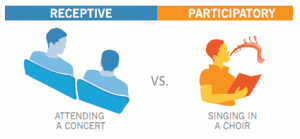4:12pm: Do cities still use orchestras to credential themselves? Jesse Rosen cites an example from Pittsburgh. Business leaders who travel to promote Pittsburgh abroad always include information about the orchestra. So yes, orchestras are still a source of pride for communities much as they were a hundred years ago.
4:05pm: The audience gives a round of applause to a woman who introduces herself as a 75-year concert attendee, until she says that in her opinion “Music without melody is noise.” Some continue to applause, some gasp. Is part of the problem our mixed bag programming? Should concerts be more thematic, so people can pick and choose?
3:55pm: What do orchestras have to learn from choruses? People have an appetite for being part of the performance itself. Over 42 million Americans sing in choruses.
3:52pm: Time for questions from the audience. Do you have something to ask? Leave a comment on this blog.
3:50pm: Orchestras being involved in “social justice” issues is a new idea in the United States, though not in other countries (Venezuela’s El Sistema program). Mark Clague: American orchestras have a representative function. As more people participate, it leads to new conversations.
3:44pm: Sphinx Organization does a series of church concerts leading up to Carnegie Hall and other larger performances. The goal is to be relevant and meet people where they are.
3:41pm: Online comments and feedback can allow for more open dialogue. Or just it does get more vicious?
3:38pm: Amos Yang: challenging music sometimes needs multiple hearings. It can be hard to get something out of it the first time.
3:37pm: Audience poll: do you want concerts with music you like? The audience is divided. Some people raise their hands, but some respond “What do you mean, ‘music we like?’ We also want to be challenged.”
3:30pm: Amos Yang is offended by people who are offended when people clap between movements. (Err, not sure I got that grammar right.) Clapping between movements has a long tradition and shows appreciation for the music.
3:28pm: How can technology be used in the context of a live performance? Afa Sadykhly Dworkin: A video of the conductor’s face communicates so much more than what you get from staring at the person’s back. Mark Clague: close-ups can help you focus on particular instruments, you actually hear the music differently, because of the visual.
3:20pm: The roundtable discussion is an opportunity to pick up on threads and conversations from earlier in the afternoon. First topic? YouTube. Amos Yang finds it a phenomenal tool for education.
3:19pm: Getting ready for our roundtable discussion with panelists from our two spotlight conversations.



